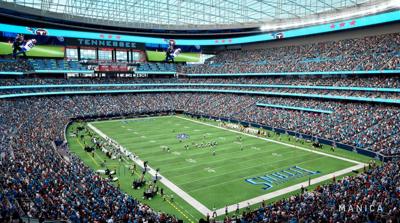This story is a partnership between the Nashville Banner and the Nashville Scene. The Banner is a nonprofit, nonpartisan news organization focused on civic news and will launch later this year. For more information, visit NashvilleBanner.com.
In a contentious meeting that featured packed galleries, shouting supporters and a slew of parliamentary procedures, the Metro Council advanced a $2.1 billion proposal to replace Nissan Stadium with a domed structure.
A third and final reading of the bill will take place next week at a specially called meeting, which will include up to four hours of public comment on the bill. Passage of the bill is all but assured.
“I’m 100 percent convinced that this is the best deal for Davidson County taxpayers,” said District 25 Councilmember Russ Pulley. Proponents of the deal have emphasized the city’s current obligation to make repairs at Nissan Stadium, estimated by some to represent between $300-$800 million in costs that would come from Metro’s general fund. The bill passed 25-11.
The stadium, which would be funded by dedicated hotel and sales tax streams as well as a $500 million grant from the state, in addition to contributions from the Titans, has faced resistance in the council, mainly from progressives
“It would represent the largest public subsidy for an NFL stadium in the history of the NFL,” said District 19 Councilmember Freddie O’Connell, who is also running for mayor. “Meanwhile, other cities are seeing fully privately funded stadiums. Worse, as we consider the proposal for a new football stadium, the state House just passed a bill that dramatically reduced local control by giving state appointments to six of the 13 members of the Sports Authority.”
The debate lasted for more than five hours as more than 25 amendments were filed. Unlike the previous council meeting, at which stadium opponents had successfully taken most of the public seating space in the gallery and created chaos for the bill’s shepherds, Tuesday night saw the opposite.
In the hours before the 6:30 p.m. meeting, Titans supporters packed the public gallery, taking nearly every available seat. Stadium opponents had ruled the day at the last meeting, loudly cheering amendments designed to slow or kill the deal and celebrating a deferral of one meeting after District 21 Councilmember Brandon Taylor’s amendment adding a per-ticket fee for some events at the stadium to generate money for the city’s general fund was voted on.
Opponents were relegated to the hallway and shouting through the doors.
“We got here around 4:45 p.m.,” said Odessa Kelly of advocacy group Stand Up Nashville. “The council meeting didn't start until 6:30 p.m. It was already full, so you know, give one to the Calvert Street team [hired by the Titans] for being able to get people here earlier than we could. We represent working-class individuals. It is very hard to build urgency around taxes.”
Kelly had roughly 30 people still there at 7 p.m., having lost a big group of SEIU members and others after being shut out of the council chamber. They were fortified by pizzas sent by District 7 Councilmember Emily Benedict, a stadium opponent, and continued to be heard inside by councilmembers, chanting “We want a public hearing,” “Don’t silence our voices” and “We are Nashville.”
One Titans supporter replied, “The votes are in here, not outside with the TV cameras.”
On the council floor, At-Large Councilmember Bob Mendes used the threat of a state takeover as the theme for a number of the 13 amendments he filed. But organized resistance from supporters, lobbyists and the administration meant that only two of them passed.
At one point, a frustrated Mendes introduced one amendment like this: "The explanation is: The administration is in favor of it, so I'm not sure anybody cares what it actually says. So let's just vote.” It passed 37-0.
At the center of the most contentious part of the debate was Taylor’s amendment, which had passed at the previous meeting, that would have introduced a surcharge on non-NFL events in the new stadium. After narrowly passing by a single vote, in the chaos of the last meeting, stadium supporters rallied behind District 3 Councilmember Jennifer Gamble’s “compromise” version. After complaints from CMA Fest organizers and others, Gamble’s amendment narrowed the scope of affected events and created a surcharge on tickets — generating the greater of $3 or 3 percent — as she argued that Taylor’s amendment would push prices too high and make it a “deal killer” for the Titans. College events like Tennessee State University games or the Final Four and College Football Playoff, plus WWE events like WrestleMania, are exempted from the fee.
Gamble’s amendment passed, and a subsequent amendment from O’Connell directed the money generated to Metro’s general fund. It’s expected to raise $4 million a year.
District 34 Councilmember Angie Henderson, who’s making a run for vice mayor, attempted to defer the meeting another week, but weary members voted the effort down. Henderson was, however, successful in opening up a public hearing before the final vote.
"This is the biggest decision we will make as a body, and probably our subsequent colleagues that will follow us, and it just strikes me as really inappropriate and tone deaf that we would not have a public hearing on something of this magnitude," Henderson said. A previous attempt to call a public hearing was unsuccessful.
Mayor John Cooper expressed his pleasure at the bill’s advance.
“I appreciate Metro Council’s diligent and thoughtful consideration of this deal, and their consistent vote of confidence that this is the right move for Nashville taxpayers,” Cooper said. “I’m also proud of the transparent and thorough process conducted to consider this proposal, which has included dozens of public meetings and extensive engagement with community and neighborhood groups throughout the city. I look forward to next week’s third and final reading.”





